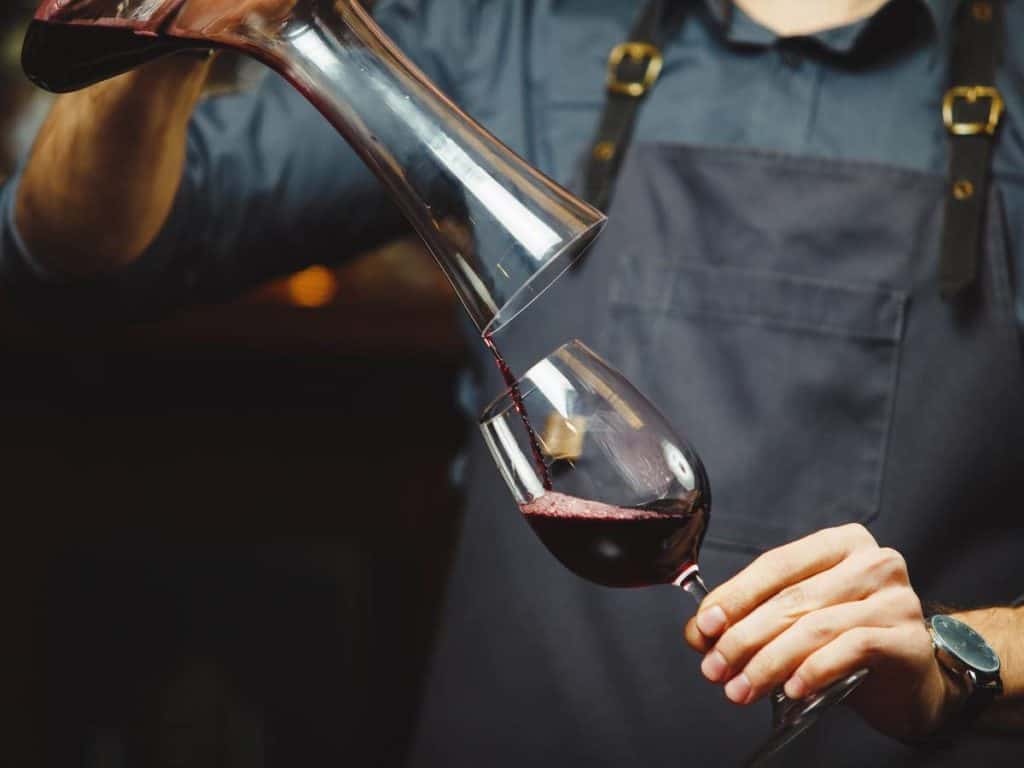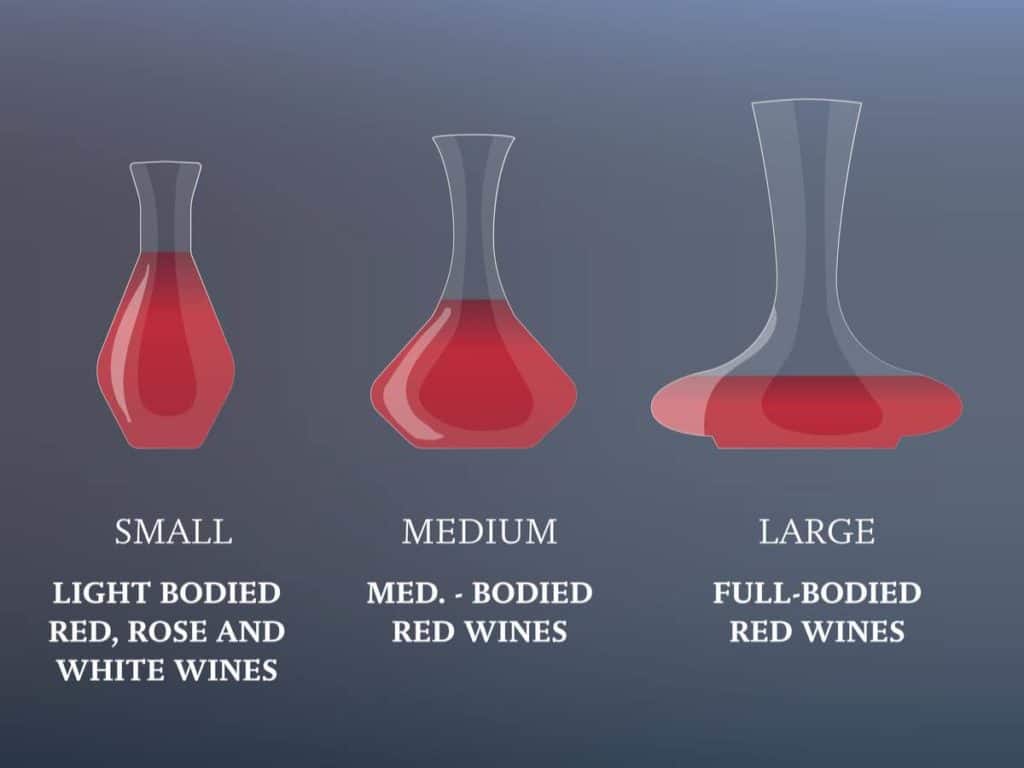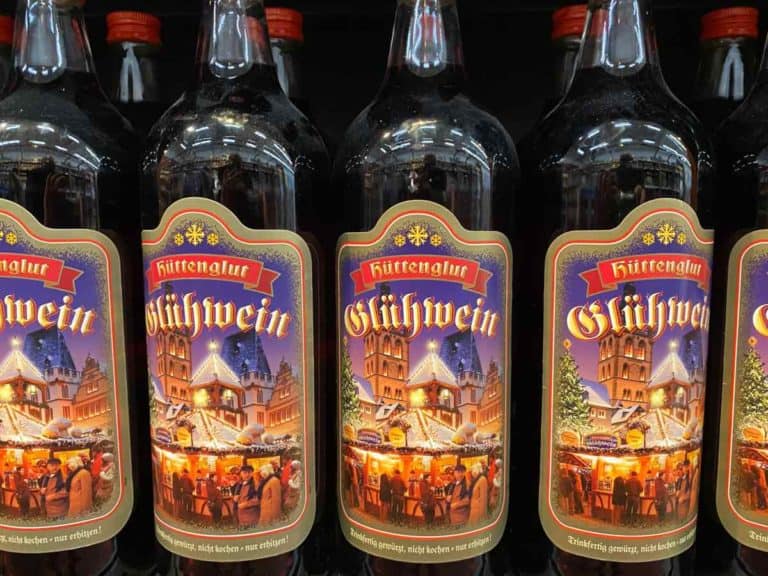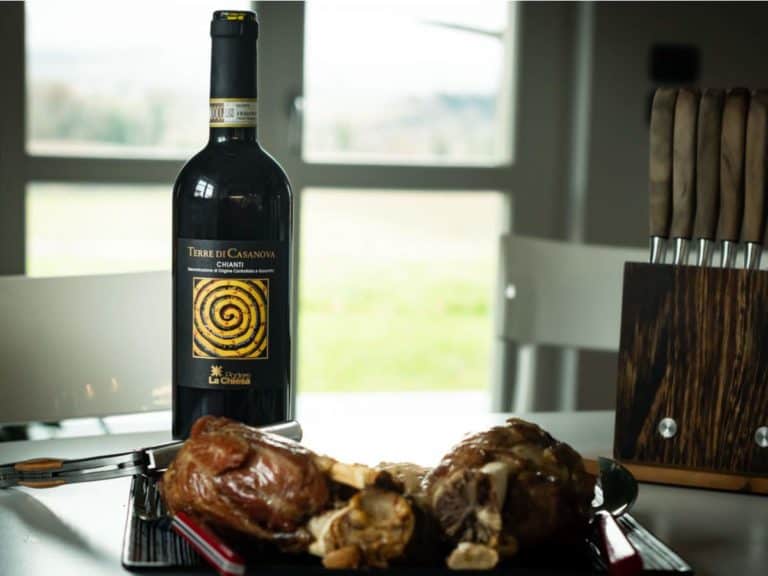What Does a Wine Decanter Do
Whether it’s a fancy dinner party or a romantic evening for two, there are several occasions where you may find that you need a wine decanter. Or perhaps, you’ve seen a decanter, and, without knowing precisely what it was, it piqued your curiosity. This article will cover all the details surrounding these elegant items.
Wine decanters are glass containers that come in various shapes and sizes, and they are designed to serve wine. First, wine is poured from the bottle into a glass decanter. Using the decanter, you can then serve individuals wine.
The rest of this article will explain a few topics related to this question, including why people use decanters, how to use them, when to use them, and more. So read on to learn the basics of wine decanters.

Why Do People Decant Wine?
Wine is an intriguing and intoxicating topic to learn about. Plenty of wine connoisseurs discuss various aspects of the winemaking and tasting process, and part of that includes a section on decanting wine.
Let’s first discuss why people decant wine at all, now that we know what a wine decanter does. You can get many different types and sizes of wine decanters. Some popular choices include swan, cornett, and duck. Each option usually comes in small, medium, and large sizes depending on your preference.
Wine decanters serve people wine, but it’s more than just a fancy glass container.
Most people decant wine because doing so separates sediment from the liquid. And it’s also a fancy glass container, which is often a classier, more elegant way to pour wine. Mostly, though, it’s about the sediment.
Have you ever noticed how there are finite particles at the bottom of many wine bottles? This is because the sediment in the wine usually settles at the bottom of the bottle and is most prevalent in red wines.
The sediment is more evident in older and vintage port wines, but even some younger wines have small amounts of finite sediment. So, if you’re hoping to impress your guests with a vintage port, you should use a decanter to separate the liquid from the sediment and enhance the flavor.
That’s another critical reason why many people enjoy decanters for wine – it aerates the wine, which improves the flavor. Aeration means that oxygen can interact with the liquid. Some people refer to this process as letting the wine breathe.
If you’ve ever used a decanter for wine, you’ve likely noticed how once it’s poured in the glass container, the aroma of the liquid fills the area – this is that wine breathing process I’m talking about.
There are also benefits to using a decanter if you break or lose the bottle’s cork. I’ve been there a time or two when I accidentally broke the cork when I’m trying to open the bottle, or it rolls off the counter and under the fridge.
Whatever the case may be, a decanter can be an excellent storage mechanism for wine when the bottle’s corkless.
To learn more about these benefits and how to serve decanted wine – check out this article from Master Class.
How To Use a Decanter
Using a decanter is a simple and easy process. As I mentioned above, a decanter is a container that holds your wine to be served.
What you want to do, especially with older wines, is let the bottle sit upright for two or three days in advance. This is important because it allows the sediment discussed earlier to settle to the bottom of the bottle and not enter into the decanter.
Once you’re ready to serve your wine, you will pour the bottle into your selected decanter. You want to pour the wine slowly and stop when you notice sediment from the bottle begin to pour.
Then, let the wine sit in the decanter for a few minutes, and then serve it up!
You can swish the wine in the decanter around a little before serving and after pouring if you want to get a good whiff, but you don’t have to. On the other hand, I wouldn’t let the wine sit in the decanter for too long unless it has a stopper.
If you let the wine sit in a decanter for an extended period, like several days, some experts think that it can make the wine too aerated and thus lose flavor.
Once you’ve finished off the wine in the decanter, you may be wondering how to clean it.
First of all, you want to avoid dish soap because this can leave a residue you don’t want to taste the next time you pour wine.
There are a couple of other ways to wash out these glass pieces. First, I usually rinse mine with warm to hot water and then let it air dry upside down so the water droplets can fall out.
This YouTube video shows another method where you can use salted ice to clean the decanter. This video also demonstrates how to use decanters, as I previously described:
When to Decant Wine
Decanting wine sometimes intimidates people who aren’t familiar with the process and aren’t avid wine drinkers. However, this simple process can improve even the most basic wine experience.
As I mentioned in the section above, it’s essential to let the bottle sit upright for several days before decanting it. This can take some planning, but this step is crucial to ensure that the sediment isn’t mixed with the liquid and settles at the bottom of the bottle.
You can hold a light under the neck of the bottle, just where it meets the shoulder, and observe the clarity. It’s ready to be decanted once it looks clear and the sediment is visibly at the bottom.
Make sure that you stop pouring the moment you see sediment clouding the liquid as you pour it, slowly, into the decanter. Sometimes you may have more leftovers in the bottle than other times; it depends on how old the wine is and how long it had to settle in an upright position before pouring.
Sometimes you need to let decanted wine sit for several minutes, hours, or even days before it’s at its optimum aerated moment.
Some older wines have a putrid smell when they’re first opened. This is because of hydrogen sulfide, and it may take longer for that particular wine to release those compounds once it’s open to oxygen.
All of this is highly dependent on the wine. Like this article from Wine Magazine says, sometimes you need to decant the wine for a minimum of one day for every decade of the bottle’s age.

Should All Wine Be Decanted?
Not all wine needs to be decanted. Some wines, particularly white wines like champagne, are better when they are not decanted. Most wine connoisseurs advise people to decant vintage ports or aged Bordeaux wines because they tend to have a lot of sediment, especially as they age.
Because decanting’s primary purpose is to separate the sediment from the liquid, this makes sense.
As wine is poured slowly into a decanter, it takes in oxygen, which then helps the flavors and aromas breakthrough. Some wines that really benefit from decanting include:
- Cabernet Sauvignon
- Cabernet blends
- Syrah
- Syrah blends
There are some who oppose decanting and claim that a quick swirl and swish of wine in a glass is sufficient for exposing the wine to oxygen. They also argue that decanting leads to too much oxygenation, which dissipates the flavor and aroma.
I disagree with these sentiments, though. I think it’s important to taste the wine right after you pour it into the decanter and then repeat as it has time to decant. This experiment will show you how much the flavor and aroma change and improve through the decanting process.
Again, you don’t have to decant wine, and you shouldn’t if you’re planning on enjoying a bottle of champagne with your friends and family. Champagne has a lot of carbonation, bubbles, and fizziness that are part of its charm and flavor. Decanting it can deplete these qualities.
However, if you’re one of those people that find Champagnes too bubbly and intense, then you might follow recent trends and decant it.
Usually, white wines are not decanted, but sometimes it’s preferred to decant them if they are vintage bottles.
Does Decanting Help Freshen Wine?
In some ways, decanting can help freshen wine. At least, it can freshen and awaken some of the flavors and aromas that have been bottled for sometimes ten, 20, or even 40 years. This process is known as aeration.
When the wine is opened up to oxygen, it changes how vintage ports and other wines taste and smell.
You need to keep in mind, though, that each wine is different and thus has different decanting times. So, you should be mindful of how long you let the wine breathe.
As I’ve mentioned before, older wines, especially vintage reds, are better when the sediment is separated from the liquid. To me, this makes the wine fresher and tastier. On the other hand, younger wines can also benefit from decanting because it helps their taste be smooth.
A little patience, planning, and a light hand are all you need to be able to decant wine well. If you do it correctly, you’ll notice that your favorite wines are often fresher, more enjoyable, and have an increased aromatic and flavorful sensation.
Do You Decant Old or New Wines?
Questions surrounding decanting have plagued wine professionals for decades. One question, in particular, is whether or not to decant certain types of wine, and if you do, how long it should be done for.
Some argue that the extra oxygen only adds to the wine’s life, flavor, and freshness, but others feel that decanting makes wine fade quickly, and you miss out on the initial phases of the wine by waiting to taste it as it decants.
According to this article from Wine Spectator, young wines can be decanted for up to an hour or more before serving and still have a satisfying taste and aroma. At the same time, older wines tend to be more fragile and should only be decanted for at the most 30 minutes.
Decanting adds mystery and elegance to a glass of wine and the entire drinking experience. I suggest trying it out for yourself and using your practice and experience to determine your preferred tasting.
Some other experts say that young wine doesn’t need to be decanted and shouldn’t be. These are the same connoisseurs who suggest only decanting old wine to remove the sediment and allow oxygen to enhance the blend’s flavor.
Again, what you do depends on the type of wine and its age. Experiment if you dare, and judge for yourself!
How Long to Decant Wine
As I have mentioned throughout this article, the time it takes to decant wine properly is highly dependent on the type of wine you’re decanting and its age.
Because age plays such a crucial role in determining this process, I thought I would break it down by age grouping to make it easier for you to practice and experiment with decanting.
How Long Does It Take to Decant 10-Year-Old Wine?
The jury is still out on decanting. Decanting is not an exact science from how long to do it and what wines to do with. However, there are some general rules that you can use to determine your personal preferences.
The length of time it takes to decant 10-year-old wine depends on the type of wine you’re pouring. For some fragile wines, 30 minutes to one hour is enough time for it to decant. For other types, it can take one to eight hours.
It seems like a simple process – just pour the bottle into another glass bottle. While this is true to an extent, there is some finesse required if you want to truly experience the best aromatic and flavorful tastes of vintage wine.
White Hall Lane says that Cabernet’s Sauvignon, Merlot’s, and Syrah’s aged about ten years should decant for about two hours. However, this same article suggests only decanting Pinot Noir for about 30 minutes.
Chamber St. Wines agrees with the previous article that Cabernet bottles under 20-years-old should decant for about two hours and the same for Bordeaux and Burgundies.
In the same article, Chamber St. Wines also states that Barolo and Barbaresco wines should decant for six to eight hours.

How Long Does It Take to Decant 15-Year-Old Wine?
15-year-old wine isn’t that much older than 10-year-old-wine and is often grouped into the same category as wines within a decade to under two decades old. However, it’s still good to know approximately how long you should decant 15-year-old wine.
The time it takes to decant 15-year-old wine depends on the type of wine that you’re decanting. In general, most experts recommend decanting 15-year-old wine for 30 minutes to four hours.
Just like with 10-year-old wine, the time it takes to decant depends on what the wine is. Going back to the previously named source, Chamber St. Wines, a Barlo that’s 15-years-old would benefit from four hours of decanting, while a 15-year-old Rohne should be decanted for one hour.
On the other hand, some experts say that the older a wine is, the more fragile it is and thus the less decanting time it requires. Therefore, some say that 30 minutes is the optimum time for wines 15-years-old and older.
How Long Does It Take to Decant 18-Year-Old Wine?
Anything under the two-decade mark for wines is usually grouped in the same category. This is especially true when considering how long it takes to decant 18-year-old wine.
Generally, it takes about 30 minutes to four hours to decant 18-year-old wine. However, the exact time is dependent on the specific bottle and type of wine.
18-year-old wine is just a hair under the two-decade mark, which means it takes about the same amount of time as what I outlined above for the 10-year-old and 15-year-old wines.
How Long Does It Take to Decant 40-Year-Old Wine?
40-year-old wine is truly a vintage age and requires more consideration when it comes to decanting. But, again, the time it takes will vary from bottle to bottle.
Most vintage 40-year-old bottles of wine can take anywhere from a few minutes to three hours to decant. The time it takes varies by wine type and bottle.
Unfortunately, there is no one size fits all to wine decanting, but you can become familiar with what each unique wine needs to taste and smell its best with practice.
Conclusion
From a technical standpoint, wine decanters have several benefits, including:
- First, they enhance the flavor by aerating the wine.
- They preserve wine when a cork is lost or broken.
However, you may not always want or need to use a wine decanter from a practical standpoint. Depending on the brand, size, and type, they can be expensive pieces to add to your kitchen or bar repertoire.
Also, not all wines need to be decanted. For example, sparkling wines like Champagne thrive without the decanting and subsequent aeration process. Even so, a wine decanter can improve the overall wine-drinking experience.





